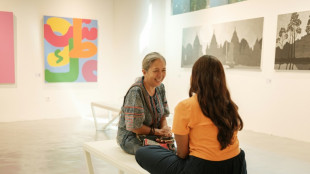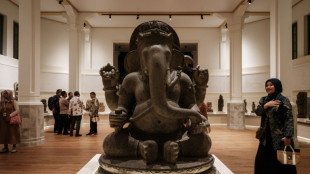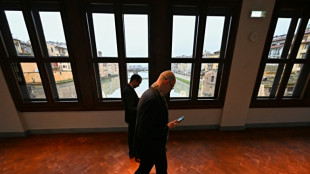
-
 Ski great Vonn finishes 14th on World Cup return
Ski great Vonn finishes 14th on World Cup return
-
Scholz visits site of deadly Christmas market attack

-
 Heavyweight foes Usyk, Fury set for titanic rematch
Heavyweight foes Usyk, Fury set for titanic rematch
-
Drone attack hits Russian city 1,000km from Ukraine frontier

-
 Former England winger Eastham dies aged 88
Former England winger Eastham dies aged 88
-
Pakistan Taliban claim raid killing 16 soldiers

-
 Pakistan military courts convict 25 of pro-Khan unrest
Pakistan military courts convict 25 of pro-Khan unrest
-
US Congress passes bill to avert shutdown

-
 Sierra Leone student tackles toxic air pollution
Sierra Leone student tackles toxic air pollution
-
German leader to visit site of deadly Christmas market attack

-
 16 injured after Israel hit by Yemen-launched 'projectile'
16 injured after Israel hit by Yemen-launched 'projectile'
-
Google counters bid by US to force sale of Chrome

-
 Russia says Kursk strike kills 5 after Moscow claims deadly Kyiv attack
Russia says Kursk strike kills 5 after Moscow claims deadly Kyiv attack
-
Cavaliers cruise past Bucks, Embiid shines in Sixers win

-
 US President Biden authorizes $571 million in military aid to Taiwan
US President Biden authorizes $571 million in military aid to Taiwan
-
Arahmaiani: the Indonesian artist with a thousand lives

-
 Indonesians embrace return of plundered treasure from the Dutch
Indonesians embrace return of plundered treasure from the Dutch
-
Qualcomm scores key win in licensing dispute with Arm

-
 Scientists observe 'negative time' in quantum experiments
Scientists observe 'negative time' in quantum experiments
-
US approves first drug treatment for sleep apnea

-
 US drops bounty for Syria's new leader after Damascus meeting
US drops bounty for Syria's new leader after Damascus meeting
-
Saudi man arrested after deadly car attack on German Christmas market

-
 'Torn from my side': horror of German Christmas market attack
'Torn from my side': horror of German Christmas market attack
-
Bayern Munich rout Leipzig on sombre night in Germany

-
 Tiger in family golf event but has 'long way' before PGA return
Tiger in family golf event but has 'long way' before PGA return
-
Pogba wants to 'turn page' after brother sentenced in extortion case

-
 Court rules against El Salvador in controversial abortion case
Court rules against El Salvador in controversial abortion case
-
French court hands down heavy sentences in teacher beheading trial

-
 Israel army says troops shot Syrian protester in leg
Israel army says troops shot Syrian protester in leg
-
Tien sets-up all-American NextGen semi-final duel

-
 Bulked-up Fury promises 'war' in Usyk rematch
Bulked-up Fury promises 'war' in Usyk rematch
-
Major reshuffle as Trudeau faces party pressure, Trump taunts

-
 Reggaeton star Daddy Yankee in court, says wife embezzled $100 mn
Reggaeton star Daddy Yankee in court, says wife embezzled $100 mn
-
Injured Eze out of Palace's clash with Arsenal

-
 Norway's Deila named coach of MLS Atlanta United
Norway's Deila named coach of MLS Atlanta United
-
Inter-American Court rules Colombia drilling violated native rights

-
 Amazon expects no disruptions as US strike goes into 2nd day
Amazon expects no disruptions as US strike goes into 2nd day
-
Man Utd 'more in control' under Amorim says Iraola

-
 Emery insists Guardiola 'still the best' despite Man City slump
Emery insists Guardiola 'still the best' despite Man City slump
-
US confirms billions in chips funds to Samsung, Texas Instruments

-
 English Rugby Football Union chairman quits amid pay row
English Rugby Football Union chairman quits amid pay row
-
Major reshuffle as Trudeau faces party pressure, Trump attacks

-
 Gatland remains as Wales boss but must 'change fortunes on the pitch'
Gatland remains as Wales boss but must 'change fortunes on the pitch'
-
Argentina's dollar craze cools under greenback-loving Milei

-
 Medici secret passageway in Florence reopens after refit
Medici secret passageway in Florence reopens after refit
-
Anger after Musk backs German far right

-
 Arteta says 'best is yet to come' as he marks five years at Arsenal
Arteta says 'best is yet to come' as he marks five years at Arsenal
-
Pereira happy to achieve Premier League 'target' with Wolves

-
 'Dark lull' in German energy transition sparks political debate
'Dark lull' in German energy transition sparks political debate
-
Russian skaters allowed to compete as neutrals in 2026 Winter Olympics


Party over: displaced families shelter in Beirut nightclub
Outside one of the Lebanese capital's most exclusive venues, a large sign advises clubbers to dress "smart casual". Now dozens of destitute families occupy its dancefloor after fleeing Israeli bombardment.
Fresh laundry hangs on the guardrails around the building housing the underground nightclub Skinn, which is also known for its rooftop Skybar offering spectacular views over the Mediterranean.
Like many other families, Rida Alaq was sleeping in the street with her 79-year-old mother for a week before her sister saw on social media that the nightclub had opened its doors to people in need.
"We're fine here," the 49-year-old said softly, as men dozed on mattresses around her in the plush jet-black interior that until recently was hosting late-night parties with top DJs.
Some 1.2 million people have been displaced by Israel's intensifying campaign against Hezbollah since September 23, according to figures released by the government on Wednesday.
Most have fled homes in the south near the Israeli border or the southern suburbs of Beirut, a Hezbollah bastion.
Alaq is among around 400 people to have found refuge in the club, according to one of its managers.
The dance floor, once buzzing with partygoers, has become a playground for children riding skateboards, while families have settled into the private booths where VIP guests sipped cocktails.
At the bar, wine glasses remain neatly stacked.
Humanitarian organisations provide the families with food, and they can use the club's showers and toilets.
- 'We want to emigrate' -
As she changed her baby boy's nappy, Batoul Kanaan said she felt safe in the nightclub.
"We'll stay until the war is over," she said.
Her husband used to work as a parking attendant for the club, which was popular among Beirut's elite who used to pack out the club and bar every weekend.
Fatima Salah, a 35-year-old nurse and mother of four, said she would not be returning to the capital's working-class southern suburbs.
"We want to emigrate. Anywhere. Britain... or even Iraq," Salah said, her face framed by a blue headscarf.
"We're scared for our children, and this war is going to be long."
On Friday, a massive strike on the southern suburbs killed Hezbollah leader Hassan Nasrallah.
Gaelle Irani, who works for the club managers, said they decided to open their doors to displaced people "the day of the big explosion", referring to the missile strike on Nasrallah on September 27.
"The owner of the place was passing by and he saw a lot of people on the streets with no shelter so he decided to open our premises," she added.
Just two kilometres (little more than a mile) away, others still sleep in the streets.
In the central Martyrs' Square, people have laid down mattresses on the ground and strung up plastic sheeting to create makeshift shelters in the middle of circling traffic.
Others have taken refuge on the steps of the huge Al-Amin mosque.
Children, many of them barely clothed, run around, while teenagers sit on the ground playing cards.
An elderly man, his legs crippled, laments having to leave his wheelchair behind in the rush to escape.
- 'Life goes on' -
Moussa Ali, another evacuee from the southern suburbs, has been living in Martyrs' Square with his two young daughters and six other family members for more than a week.
A sanitation worker, Ali fled the Hezbollah stronghold on September 23 as soon as Israeli air strikes began.
"We were so scared for the children," he said, wearing a black t-shirt emblazoned with the words "Life Goes On".
He hasn't changed clothes since they fled, nor has his two-year-old daughter, Zamzam, who clings to him.
Although volunteers are distributing food, the conditions are grim. There are no toilets, and the displaced have no access to basic hygiene facilities.
Sitting apart from the others, the Abdallah family arrived late on Tuesday evening after a bomb exploded near their home in the southern suburbs.
Still in shock, Dib, the father, described how the explosion hurled him against a wall and the terrifying sound of the munition as it fell.
"It was horrible, horrible," he said.
When the warhead detonated, shards of glass rained down on his nine-year-old son Ali, who had been sleeping.
The boy, smiling despite his ordeal, was wearing only light blue underwear and a t-shirt, his feet dirty in his plastic slippers.
H.Silva--PC
